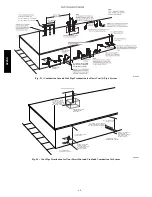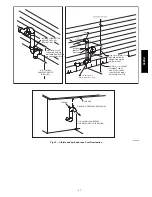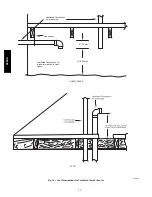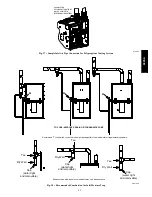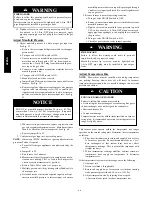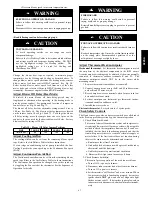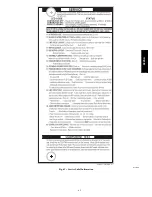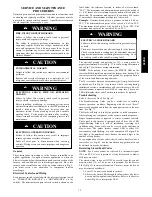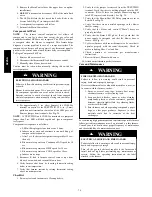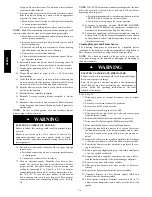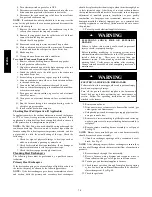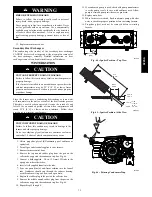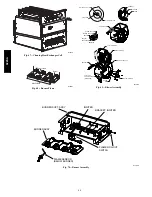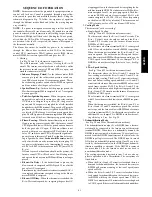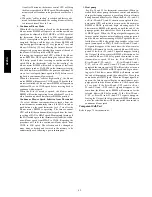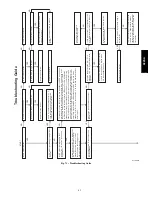
74
3. Remove the Main/Control door (the upper door on upflow
installations).
4. BRIEFLY disconnect and reconnect ONE of the main limit
wires.
5. The LED will flash the last stored fault code. Refer to the
Service Label (Fig. 63) to interpret the LED.
6. A component test sequence will follow.
7. Reinstall the Main/Control door.
Component Self-Test
NOTE
:
The furnace control component test allows all
components to run for a short time; except the gas valve and
humidifier terminal HUM are not energized. The EAC-1 terminal
is energized when the blower is energized. This feature helps
diagnose a system problem in case of a component failure. The
component test feature will not operate if any thermostat signal is
present at the control and not until all time delays are completed.
To Begin Component Self-Test:
1. Remove blower access door.
2. Disconnect the thermostat R lead from furnace control.
3. Manually close blower door switch.
Caution must be taken when manually closing this switch for
service purposes.
ELECTRICAL SHOCK HAZARD
Failure to follow this warning could result in personal injury,
or death.
Blower door switch opens 115--v power to furnace control.
No component operation can occur unless switch is closed.
Exercise caution to avoid electrical shock from exposed
electrical components when manually closing this switch for
service purposes.
!
WARNING
4. For approximately 2 sec, short (jumper) the COM-24v
terminal on control to the TEST/TWIN 3/16—in. (5 mm)
quick-connect terminal on control until the LED goes off.
Remove jumper from terminals. See Fig. 38.
NOTE
: If TEST/TWIN and COM-24v terminals are jumpered
longer than 2 sec, LED will flash rapidly and ignore component
test request.
Component test sequence is as follows:
a. LED will display previous status code 4 times.
b. Inducer motor starts and continues to run until Step g of
component test sequence.
c. After 7 sec the hot surface igniter is energized for 15 sec.,
then off.
d. Blower motor operates on Continuous-FAN speed for 10
sec.
e. Blower motor operates on HEAT speed for 10 sec.
f. Blower motor operates on COOL speed for 10 sec.
g. Inducer motor stops.
5. Reconnect R lead to furnace control, remove tape from
blower door switch, and re-install blower door.
6. Verify furnace shut down by lowering thermostat setting
below room temperature.
7. Verify that furnace restarts by raising thermostat setting
above room temperature.
Checklist
1. Put away tools and instruments. Clean up debris.
2. Verify that the jumper is removed from the TEST/TWIN
terminal. Verify that there is nothing plugged into the PLT
connector. (Note: If there is a jumper connector plugged
into PLT, remove it and discard.) See Fig. 38.
3. Verify that the Blower/Heat Off Delay jumpers are set as
desired. See Fig. 38.
4. Verify that there are no unsealed openings in the blower
shelf or casing.
5. Verify that the blower and control (“Main”) doors are
properly installed.
6. Verify that the Status LED glows. If not, check that the
power supply is energized and that the blower door is
secure. See Fig. 63.
7. Cycle test furnace with room thermostat to be sure that it
operates properly with the room thermostat. Check all
modes including Heat, Cool and Fan.
8. Check operation of accessories per manufacturer’s
instructions.
9. Review Owner’s Manual with owner.
10. Attach entire literature packet to furnace.
Care and Maintenance
FIRE OR EXPLOSION HAZARD
Failure to follow this warning could result in personal
injury, death and/or property damage.
Never store flammable or combustible materials on, near, or
in contact with the furnace, such as:
1. Spray or aerosol cans, rags, brooms, dust mops,
vacuum cleaners, or other cleaning tools.
2. Soap powders, bleaches, waxes or other cleaning
compounds, plastic or plastic containers, gasoline,
kerosene, cigarette lighter fluid, dry cleaning fluids,
or other volatile fluids.
3. Paint thinners and other painting compounds, paper
bags, or other paper products. Exposure to these
materials could lead to corrosion of the heat
exchangers.
!
WARNING
For continuing high performance and to minimize possible furnace
failure, periodic maintenance must be performed on this furnace.
Consult your local dealer about proper frequency of maintenance
and the availability of a maintenance contract.
ELECTRICAL SHOCK AND FIRE HAZARD
Failure to follow this warning could result in personal injury,
death, and/or property damage.
Turn off the gas and electrical supplies to the furnace and
install lockout tag before performing any maintenance or
service. Follow the operating instructions on the label
attached to the furnace.
!
WARNING
922SA

